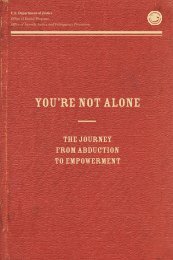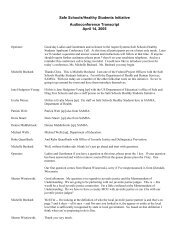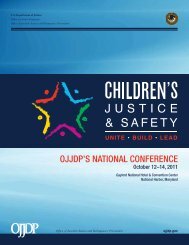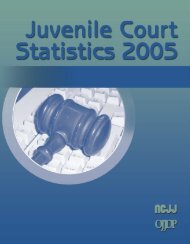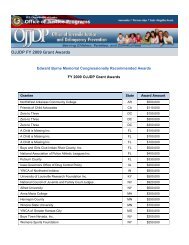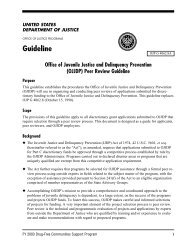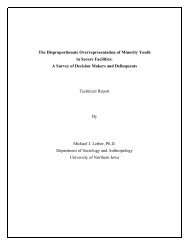OJJDP Family Listening Sessions: Executive Summary - Office of ...
OJJDP Family Listening Sessions: Executive Summary - Office of ...
OJJDP Family Listening Sessions: Executive Summary - Office of ...
Create successful ePaper yourself
Turn your PDF publications into a flip-book with our unique Google optimized e-Paper software.
Questions and Responses<br />
Question 1—Involvement With the System<br />
Think about when your child and your family first got involved with the system. What did<br />
you expect it to be like and how was it different<br />
The families identified several issues related to their first involvement with the system, which<br />
included:<br />
• Lack <strong>of</strong> access to counsel.<br />
• No available prevention/intervention services for children’s issues before they enter the<br />
system.<br />
• Issues with unsafe housing.<br />
• Inadequate health care and nutritious food.<br />
Lack <strong>of</strong> Access to Counsel<br />
Parents were called when their children were first arrested. They <strong>of</strong>ten had to make difficult<br />
decisions on the spot without the benefit <strong>of</strong> counsel to advise them whether their child should<br />
cooperate with law enforcement. It became the parents’ responsibility to tell their children what<br />
to do, and they ended up being the de facto counsel. This arrangement <strong>of</strong>ten led to an uninformed<br />
waiver <strong>of</strong> the child’s Fifth Amendment protections against self-incrimination.<br />
No Available Prevention/Intervention Services<br />
Parents described scenarios in which their children started to have behavioral or mental health<br />
issues at home or school; however, they were unable to find resources or support in the<br />
community prior to their children’s entry into the system. It was not until the child became<br />
involved in the system that they received the help they were hoping for or expecting. Parents also<br />
talked about failures in the schools and the lack <strong>of</strong> community response to issues such as truancy,<br />
which are considered as “pipelines” to detention.<br />
Parents stated that alternative high schools are nothing more than a dumping ground for the “bad<br />
kids” and a pipeline to detention or adult jail. Parents referred to them as holding facilities for jail<br />
and perceived the teachers assigned to teach at the alternative schools as the worst <strong>of</strong> the worst.<br />
They shared that there is a stigma associated with these schools; therefore. placement in such a<br />
school is humiliating to children.



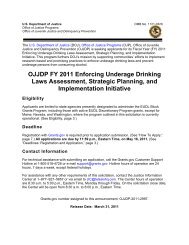
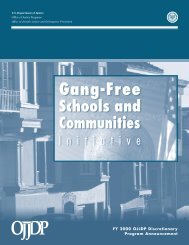
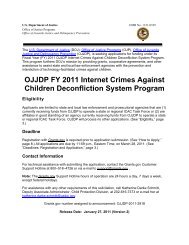
![Chapter 5 [PDF] - Office of Juvenile Justice and Delinquency ...](https://img.yumpu.com/46584340/1/190x245/chapter-5-pdf-office-of-juvenile-justice-and-delinquency-.jpg?quality=85)

